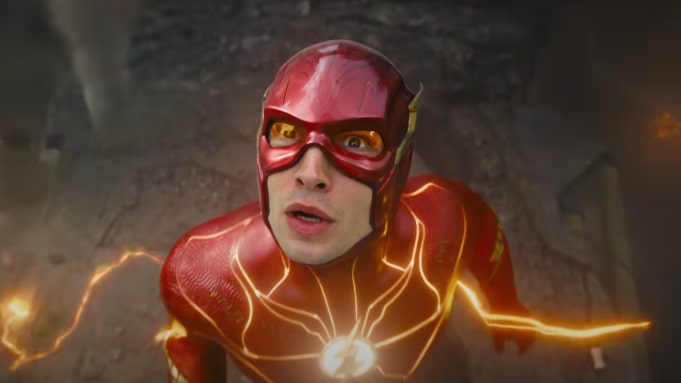
Before going to see “The Flash,” I knew nothing about the character other than he ran very fast. I never read the comic books, never watched the TV series, never saw any of the other movies he appeared in. My only awareness of The Flash was having seen Sheldon Cooper on “The Big Bang Theory” wearing the character’s logo on his t-shirts.
I also knew most comic book superheroes have two things in common.
One is that the final battle between creatures with superhuman powers always comes down to what is essentially a fist fight. Superhero hits Supervillain, sending them flying into a nearby wall or other immovable object. Then Supervillain retaliates, kicking Superhero in the other direction. And repeat ad nauseam.
The other trope is that the creators of these movies forsake any sense of humor in favor of a far too serious attitude about their cinematic universe. The rare exceptions include Tim Burton’s “Batman” from 1989, which allowed the Jack Nicholson and Robert Wuhl characters to be funny. Another would be Richard Donner’s “Superman” from 1978, including the scene where Superman catches a falling Lois Lane and tells her, “Don’t worry, I’ve got you.” To which she replies, “You’ve got me? Who’s got you?”
While “The Flash” does have several super-fist-fight sequences, it also includes some comedic moments (e.g. a running joke about the “Back To The Future” movies) that differentiate it from the rest of the more recent genre.
The movie is an origin story of sorts for Barry Allen (Ezra Miller, who uses they/them pronouns), the fastest member of the Justice League, which also includes Superman, Batman, Wonder Woman, Aquaman, and I don’t know who else. With their father about to be sentenced to life in prison for killing his mother, Barry decides to use super-speed to go back in time and save her, and thus him, too. Barry is warned by Bruce Wayne (Ben Affleck) that doing so will create a ripple in time a la The Butterfly Effect, but Barry disregards the advice and flashes back anyway.
Of course, Wayne was right, and Barry’s impulsive action causes all sorts of problems that he needs other members of the Justice League to solve. Unfortunately, they don’t exist in the new timeline, except for Bruce/Batman, now played by Michael Keaton, reprising the role he first played in 1989. Keaton’s appearance isn’t as a cameo (there are plenty of those later, which I won’t spoil). Rather, he is an important part of the story, and unlike his co-stars, Keaton is the only one not acting like he’s in a superhero movie.
From there, the situation gets worse as General Zod (Michael Shannon) arrives on Earth and threatens the entire planet. And those are the only plot points I’ll share with you, because if you go see “The Flash,” you deserve to be surprised by what follows, as I was.
Screenwriter Christina Hodson and director Andy Muschietti made the right decision in not making a movie that would only appeal to superhero super-fans, but instead produced something for a broader audience that includes people like me.
Overriding all of that is the matter of Ezra Miller’s history outside of the movie. Their non-acting resume includes multiple arrests, allegations of sexually harassing and assaulting women, calling people Nazis, and more. Whether that will impact the box office success of “The Flash” will become evident over the next few weeks, but apparently the execs at Warner Brothers and DC have no problem propping them up in this starring role.
That’s irresponsible and abhorrent. No one who treats others that way should be rewarded with fame and fortune. Frankly, Miller is the weakest performer in “The Flash,” a bargain-basement Andy Samberg in both look and tone. The studio should have insisted they be replaced. After all, how many different actors have played Batman, Spider-Man, and Superman without losing the audience?
I can’t get those issues out of my head, and I’m more than a little embarrassed to admit I kinda enjoyed “The Flash.” Yes, it’s just a breezy, mindless summer action film, but ignoring the allegations against Miller sends the wrong message to the public and does a disservice to their victims. In the last several years, we’ve seen the real-world effects of society giving a pass to bullies, harassers, and haters, then watching them grow in power and influence.
Miller is nowhere near the top of the list, but they’re on it, and that’s enough for me to withhold a rating and recommendation for “The Flash.”
